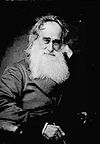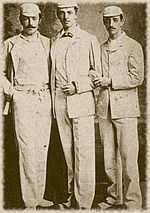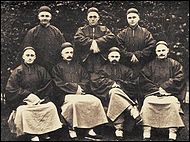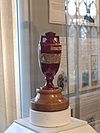- Charles Studd
-
Charles Studd 
Personal information Full name Charles Thomas Studd Born 2 December 1860
Spratton, Northamptonshire, EnglandDied 16 July 1931 (aged 70)
Ibambi, Belgian CongoBatting style Right-hand Bowling style Right-arm medium-fast Relations George Studd (brother)
Kynaston Studd (brother)
Herbert Studd (brother)
Reginald Studd (brother)
Arthur Studd (brother)International information National side England Test debut (cap 37) 28 August 1882 v Australia Last Test 17 February 1883 v Australia Domestic team information Years Team 1881–1884 Marylebone Cricket Club 1880–1883 Cambridge University 1879–1884 Middlesex Career statistics Competition Test First-class Matches 5 99 Runs scored 160 4,391 Batting average 20.00 30.49 100s/50s –/– 8/14 Top score 48 175* Balls bowled 384 22,655 Wickets 3 444 Bowling average 32.66 17.36 5 wickets in innings – 32 10 wickets in match – 9 Best bowling 2/35 8/40 Catches/stumpings 5/– 73/– Source: Cricinfo, 10 June 2011 Charles Thomas Studd, often known as C. T. Studd, was born 2 December 1860, Spratton, Northamptonshire, England, and died 16 July 1931, Ibambi, Belgian Congo.
In 1888 he married Priscilla Stewart, and their marriage produced four daughters, and two sons (who died in infancy).
Studd is remembered both as a cricketer and missionary. As a cricketer he played for England in the 1882 match won by Australia which was the origins of Ashes. As a British Protestant Christian missionary to China he was part of the Cambridge Seven, and later was responsible for setting up the Heart of Africa Mission which became the Worldwide Evangelisation Crusade (now WEC International).
Contents
Faith
Studd's wealthy father Edward Studd became a Christian during a Moody-Sankey campaign in England, and a visiting preacher to the Studd household converted C.T. and his three brothers to the faith while they were students at Eton. According to his conversion narrative, the preacher asked him if he believed God's promises, and as Charles' answer was not convincing enough, the guest pressed the point. Charles later recalled the moment:
- "I got down on my knees and I did say 'thank you' to God. And right then and there joy and peace came into my soul. I knew then what it was to be 'born again,' and the Bible which had been so dry to me before, became everything."
Studd continued from Eton to Trinity College, Cambridge, where he graduated in 1883.[1] In 1884 after his brother George was taken seriously ill Charles was confronted by the question, "What is all the fame and flattery worth ... when a man comes to face eternity?" He had to admit that since his conversion six years earlier he had been in "an unhappy backslidden state." As a result of the experience he said, "I know that cricket would not last, and honour would not last, and nothing in this world would last, but it was worthwhile living for the world to come."
Studd emphasised the life of faith, believing that God would provide for a Christian's needs. His father died while he was in China, and he gave away his inheritance of £29,000, specifying £5,000 to be used for the Moody Bible Institute, £5,000 for George Muller mission work and his orphans, £5,000 for George Holland's work with England's poor in Whitechapel, and £5,000 to Commissioner Booth Tucker for the Salvation Army in India.
Studd believed that God's purposes could be confirmed through providential coincidences, such as a sum of money being donated spontaneously at just the right moment. He encouraged Christians to take risks in planning missionary ventures, trusting in God to provide. His spirituality was intense, and he mostly read only the Bible. Another work that influenced him was The Christian's Secret of a Happy Life. Although he believed that God sometimes healed physical illnesses through prayer and the anointing of oil, he also accepted that some ailments were chronic, and in his last years he regularly took morphine, causing some controversy. Studd also believed in plain speaking and muscular Christianity, and his call for Christians to embrace a "Don't Care a Damn" (DCD) attitude to worldly things caused some scandal. He believed that missionary work was urgent, and that those who were unevangelised would be condemned to hell.
Studd wrote several books, including "The Chocolate Soldier" and "Christ's Etcetera's".
Missionary work
Studd began as an evangelist, and among those he influenced were Wilfred Grenfell and Frederick Brotherton Meyer.
Part of a series on
Protestant
missions
to Africa
Robert Moffat Background
Christianity
Protestantism
Missions timeline
Christianity in AfricaPeople
William Anderson
John Arthur
Samuel Bill
Christian Ignatius Latrobe
David Livingstone
George Grenfell
William Henry Sheppard
Alexander Murdoch Mackay
Helen Roseveare
Mary Slessor
Charles StuddMissionary agencies
American Board
Africa Inland Mission
Baptist Missionary Society
Berlin Missionary Society
Congo-Balolo Mission
Christian and Missionary Alliance
Church Missionary Society
Heart of Africa Mission
Livingstone Inland Mission
London Missionary Society
Mission Africa
Paris Evangelical Missionary Society
Rhenish Missionary Society
SPG
WEC InternationalPivotal events
Slave Trade Act 1807
Slavery Abolition Act 1833
As a result of his brother's illness and the effect it had upon him, he decided to pursue his faith through missionary work in China and was one of the "Cambridge Seven" who offered themselves to Hudson Taylor for missionary service at the China Inland Mission, leaving for there in February 1885. Of his missionary work he said,
Some want to live within the sound of church or chapel bell; I want to run a rescue shop within a yard of hell.
While in China he married Priscilla, in a ceremony performed by a Chinese pastor, and four daughters were born. Studd believed that God had given him daughters to educate the Chinese about the value of baby girls.
On returning to England he was invited to visit America where his brother Kynaston had recently arranged meetings which had led to the formation of the Student Volunteer Movement. He also here influenced John Mott
Between 1900-1906 Studd was pastor of a church at Ootacamund in Southern India and although it was a different situation to the pioneer missionary work he had undertaken in China, his ministry was marked by numerous conversions amongst the British officials and the local community. However, on his return home Studd met a German missionary named Karl Kumm, and he became concerned about the large parts of Africa that had never been reached with the Gospel. In 1910 he went to the Sudan and was concerned by the lack of Christian faith in central Africa. Out of this concern Studd was led to set up the Heart of Africa Mission. His speaking on the subject inspired Howard Mowll (Bishop of China, and later Archbishop of Sydney), Arthur Pitts-Pitts (of the Church Missionary Society in Kenya), and Graham Brown (Anglican Bishop of Jerusalem). As an HQ for the venture, the Studds chose 17 Highland Road in Upper Norwood, South London. Like Hudson-Taylor, Studd believed that funds for the work should not be directly solicited. Finances were often tenuous. However, he enjoyed the support of Lord Radstock.
Against medical advice, Studd first visited the Belgian Congo in 1913 in the company of Alfred Buxton, and he established four mission stations in an area then inhabited by eight different tribes. Studd returned to England when Priscilla fell ill, but when he returned to the Congo in 1916 she had recovered sufficiently to undertake the expansion of the mission into the Worldwide Evangelisation Crusade with workers in South America, Central Asia and the Middle East as well as Africa. Supported by his wife's work at home, Studd built up an extensive missionary outreach based on his centre at Ibambi in Budu territory. Priscilla made a short visit to the Congo in 1928. That was the last time they met; she died the following year. Studd was joined in his work by his daughter Pauline and son-in-law Norman Grubb, and his grandson Noel Grubb, who died on his first birthday, is buried at Nala. Studd's daughter Edith married Buxton.
In 1931, still labouring for the Lord at Ibambi at the age of seventy, Charles Studd died from untreated gallstones, but his vision for China, India and Africa was maintained by Norman Grubb, who took charge of WEC. In total he spent some fifteen years in China and six in India on his missionary work and then he devoted the rest of his life to spreading the Gospel message in Africa, founding the Worldwide Evangelisation Crusade (now WEC International). To this day, his name remains linked with the evangelisation of the Congo Basin, and in 1930 he was made a Chevalier of the Royal Order of the Lion by the King of the Belgians. His biography, by Norman Grubb, was exceptionally popular, and some of his own writings are still in print [1].
Cambridge Seven
The seven Cambridge students who became missionaries (known as the Cambridge Seven) to China were:
- C. T. Studd
- Montagu Beauchamp
- S. P. Smith
- A. T. Polhill-Turner
- D. E. Hoste
- C. H. Polhill-Turner
- W. W. Cassells
Cricketing career
Studd gained fame as a cricketer representing England's Cambridge University as a Gentlemen of India, Middlesex at Cricket. Charles was the youngest and best known of The Studd Brothers. By the time he was sixteen he had started to excel at cricket and at nineteen was captain of his team at Eton College; after school he went to Trinity College, Cambridge, where he was also recognised as an outstanding cricketer.
Ashes, 1882
Studd played in the original Test against Australia where the Ashes were first named and was one of the last two batsman in. When Studd went in, England needed a mere ten runs to win. However, an eccentric performance by his batting partner Ted Peate led to the match being lost.
A week later, the relevant edition of the Sporting Times included a mock obituary which has assumed iconic status:
- IN AFFECTIONATE REMEMBRANCE
- OF ENGLISH CRICKET
- WHICH DIED AT THE OVAL, 29th AUGUST, 1882,
- DEEPLY LAMENTED BY A LARGE CIRCLE OF
- SORROWING FRIENDS AND ACQUAINTANCES
- R.I.P.
- N.B.-THE BODY WILL BE CREMATED AND THE
- ASHES TAKEN TO AUSTRALIA.
Studd's fame lives on though through the inscription preserved on the Ashes urn to this day, which reads,
- When Ivo goes back with the urn, the urn;
- Studds, Steel, Read and Tylecote return, return;
- The welkin will ring loud,
- The great crowd will feel proud,
- Seeing Barlow and Bates with the urn, the urn;
- And the rest coming home with the urn.
Daughters
- Grace Studd married Martin Sutton, and, after his death, David Munro (who converted to Christianity only later)
- Dorothy Studd married the Rev Gilbert A Barclay
- Edith Studd married Alfred Buxton
- Pauline Studd married Norman Grubb
See also
- List of China Inland Mission missionaries in China
- 19th Century Protestant Missions in China
- Christianity in China
- Norman Grubb
Family
References
- ^ Studd, Charles Thomas in Venn, J. & J. A., Alumni Cantabrigienses, Cambridge University Press, 10 vols, 1922–1958.
- C.T. Studd: Cricketer and Pioneer by Norman Grubb ISBN 0-7188-3028-8
- Faith on Fire: Norman Grubb and the building of WEC by Stewart Dinnen ISBN 1-8579-2321-9
Further reading
- Historical Bibliography of the China Inland Mission
External links
Categories:- 1860 births
- 1931 deaths
- People from Northamptonshire
- Old Etonians
- Alumni of Trinity College, Cambridge
- English cricketers
- England Test cricketers
- Middlesex cricketers
- Cambridge University cricketers
- Marylebone Cricket Club cricketers
- I Zingari cricketers
- Gentlemen cricketers
- North v South cricketers
- Christian missionaries in China
- Christian missionaries in India
- Christian missionaries in the Democratic Republic of the Congo
- English Christian ministers
- English Christian missionaries
- Royal Order of the Lion recipients
Wikimedia Foundation. 2010.



